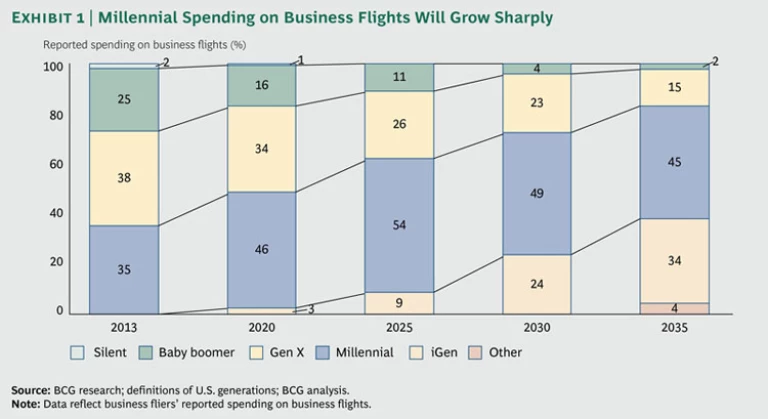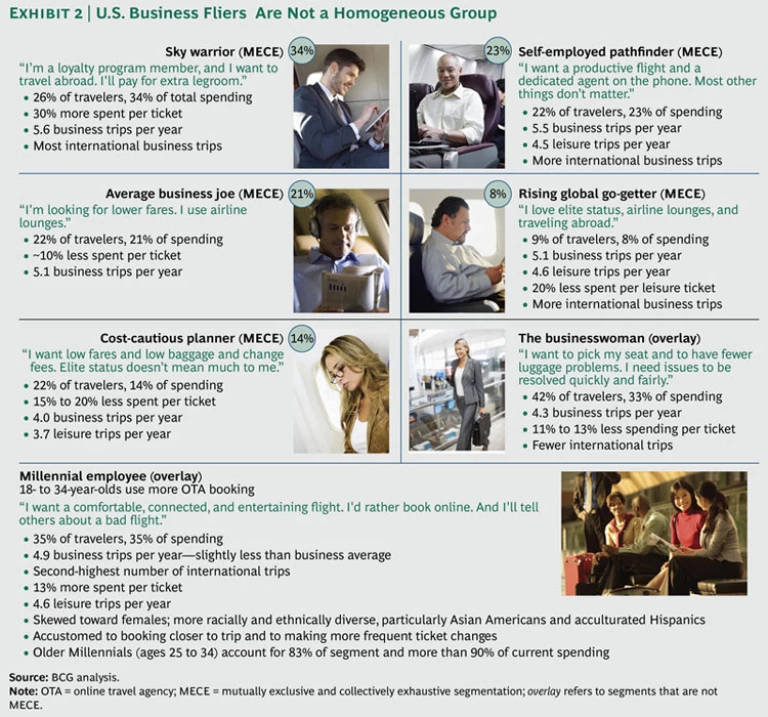Millennials in the U.S. value diversity, embrace a global perspective, and are open to new experiences. These characteristics—which suggest a generation of natural travelers—are good news for the travel industry. At this stage in their lives, however, many of today’s 16- to 34-year-olds have limited discretionary income and choose to dine out, shop for apparel, or save for big-ticket items such as education, a home, or a car instead of spending their money on travel. Millennials also seem to be more affected by adverse economic conditions than non-Millennials. As a result, most Millennials can’t afford extensive leisure travel, and few are fully active business travelers—yet. We estimate that they currently account for about one-third of total U.S. spending on business flights.
Although members of the Millennial generation are not yet the core customers of airlines, hotels, and travel companies, they will be in five to ten years, when they enter their peak earning, spending, and traveling years. In fact, their spending on business flights is projected to grow sharply in the next several years, reaching nearly 50 percent of the total by 2020 or so and remaining strong for the 15 years after that. By comparison, as the baby boomers age, their spending will likely drop to only about 16 percent of total reported spending on business flights by 2020 and to 11 percent by 2025. (See Exhibit 1.)
Millennials are already engaging with brands, forming perceptions, and developing travel habits and preferences. These nascent tendencies will solidify as members of this generation age. Airlines, hotels, and destinations that don’t reach out to Millennials now, seeking to understand and address their unique needs, may miss the boat entirely.
Forward-looking companies in the travel and tourism industry are already thinking about how to earn the business and loyalty of U.S. Millennials and how to capitalize on the strong influence that they report having on family, friends, classmates, coworkers, and—thanks to social media—even complete strangers. It is interesting to note that younger Millennials (ages 18 to 24) are three times more likely to report strong brand loyalty than their non-Millennial counterparts, and the vast majority of Millennials report taking action on behalf of brands and sharing brand preferences in their social groups. This loyalty does not yet appear to extend to airlines. In fact, younger Millennials are four times more likely than non-Millennials to strongly disagree when asked whether they are loyal to one or more of the airlines. And travel companies should take note: far more Millennials than non-Millennials believe that booking travel is burdensome. A clear opportunity exists to shape this generation’s travel-brand preferences.
But many companies in the travel and tourism industry—hotels and airlines especially—face a particular challenge. Given their capital intensity, long-term planning horizons, and lengthy development cycles, they do not have the luxury of waiting to start creating a Millennial strategy.
In addition to focusing on long-term planning and development, an effective strategy must consider how branding and marketing, loyalty programs, distribution channels, and amenities must change to meet the needs and preferences of Millennials. For example, Millennials are more likely to book both leisure and business travel with the help of aggregators such as Kayak and Travelzoo or through online travel agencies (OTAs) such as Expedia and Priceline and to use a mobile device for making travel arrangements. Also, Millennials report less overall fatigue and frustration with airports and the flying experience in general than non-Millennials. Perhaps because they are at an earlier stage of life, Millennials haven’t had enough exposure to be truly discriminating. Because of factors such as these—as well as the cross-functional nature of any effective targeted strategy—travel and tourism companies will face a range of challenges as they develop and execute their plans and tactics. But waiting is not an option. Although most Millennials are just now beginning to develop their travel preferences, the window of opportunity to win their business—and their mind share—is limited. Forward-looking companies are taking action now.
The Boston Consulting Group joined forces with Service Management Group (SMG) and Barkley to survey the brand preferences and buying habits of 4,000 Millennials (ages 16 to 34) and 1,000 non-Millennials (ages 35 to 74) in the U.S. This survey included questions about preferences related to business and leisure travel. Separately, BCG conducted two additional studies. The first surveyed 3,770 U.S. air travelers—including 430 Millennials—about their travel habits and preferences, dividing travelers into business and leisure segments. The second study focused on the online behaviors and preferences of 570 Millennial and 1,010 non-Millennial travelers. Our research showed that travelers are by no means a wholly homogeneous group, and we identified a number of distinct segments, including Millennial business travelers and leisure travelers. (See Exhibit 2.)
In this report, the third publication in our series on Millennial consumers, we present our findings from all three surveys of this generation and its approach to business and leisure travel. We focus on trips that involve flying, since these tend to involve greater distances than road trips, lengthier stays, and higher per-trip spending. The insights the surveys revealed have implications for all companies in the travel and tourism industry, as well as all aspects of their operations: marketing, distribution, customer service, and capital planning.
Like the two earlier publications, this report aims to distinguish between behaviors, attitudes, beliefs, and habits that are generation specific and will persist and those that are age specific and will conform to historical norms as the generation ages. These insights will be critical for airlines and other companies in the travel and tourism industry, whose key challenge is to determine how and when to introduce their brands and services in ways that will help shape the emerging preferences of the Millennials—and lead to a higher share of wallet.






